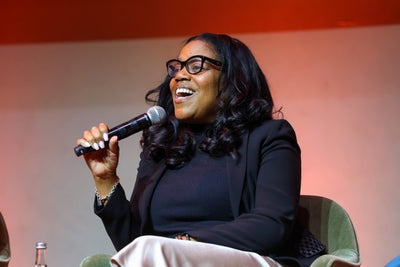
Contributing Writer, McKenzie Jackson of www.californiablackmedia.org
Daniel Ash lit his first cigarette 13 years ago while playing a game of pool in a Jacksonville, N.C. bar.
While the Woodland Hills, Calif. resident is grateful that the young lady who turned him on to smoking bore no resemblance to Joe Camel or the Marlboro Man, he admits that cigarette company advertisements played at least a small role in influencing his willingness to take up the habit.
“I remember those advertisements,” said the 31-year-old Ash. “They weren’t the main reason I smoked, but I guess seeing them … made it a little easier.”
Seven years after Ash flicked away his smoking habit like a smoldering butt, a landmark court judgment is now requiring tobacco corporations — including Philip Morris USA, Altria Group, R.J. Reynolds and Lorillard — to buy “apology” advertisements in media outlets nationwide. In the ads, which are set to appear in print publications, on radio stations and in television broadcasts, the companies will admit to deliberately misleading the public about the deadly hazards of smoking.
However, after being the focus of cigarette advertisements for decades, 90 percent of U.S. print publications geared toward African-American readers will receive zero “apology” advertisements. No ads were purchased on black-owned radio stations. Out of 13 black-owned newspapers set to receive the ads, none are based in California.
Dr. William H. Lee, owner and publisher of the Sacramento Observer, said it is regrettable that most readers of African-American publications will not see the apologetic ads.
“We are in this day and age [and] they continue to overlook the black press — the press that really serves the African-American community with messages of importance,” said Lee, whose paper is distributed throughout the Sacramento metropolitan area. “The vehicles … that really service these communities are being overlooked.”
The apology advertisements are set to come a decade after the Justice Department and the Tobacco-Free Kids Action Fund sued the major cigarette makers. In 2005, the largest tobacco manufacturers were found guilty of violating the Racketeer Influenced and Corrupt Organizations (RICO) Act when they lied to the public about the harm and addictiveness of smoking.
In 2006, U.S. District Court Judge Gladys Kessler ordered the companies to halt those practices and design and purchase a series of full-page advertisements in newspapers and commercials on network television to air for a year during prime time. According to reports, the order will cost tobacco companies upwards of $45 million.
Each corrective ad is to be prefaced by a statement that a federal court has concluded that the defendant tobacco companies “deliberately deceived the American public.” Among the required statements are that smoking kills more people than murder, AIDS, suicide, drugs, car crashes and alcohol combined, and that “secondhand smoke kills over 38,000 Americans a year.”
Across the nation, only 13 of 200 black-owned publications will carry the health conscious advertisements. Those papers are The Arizona Informant, the Denver Weekly News, the Inner-City News (Conn.), the Gary Crusader (Ind.), the Louisville Defender, Insight News (Minnesota), the St. Louis American, the Omaha Star, the Ohio City News, Black Chronicle (Oklahoma), the Portland Skanner, the Seattle Skanner, and the Milwaukee Courier.
Lee said it is unclear why those publications were selected to run the ads. “There are a few black papers being utilized, but some of the areas I have never heard of,” he said. “[The apology ads] are in mainstream media, and there is nothing wrong with that. But they need make sure these hard-hit communities are serviced with messages, too.”
According to the American Lung Association, since smoking among whites has declined, tobacco companies have targeted both African American and Hispanics with intensive merchandising — which includes advertising in media focused on black and Latino communities and sponsorship of civic groups and athletic, cultural, and entertainment events.
“African-American communities have been bombarded with cigarette advertising,” the ALA website reads. “Since the signing of the Master Settlement Agreement (MSA) in 1998 through 2005, the average youth in the United States is annually exposed to 559 tobacco ads, every adult female 617 advertisements, and every African-American adult 892 ads. Money spent on magazine advertising of mentholated cigarettes, popular with African-Americans, increased from 13 percent of total ad expenditures in 1998 to 49 percent in 2005.”
The harm caused by tobacco use affects all races, but according to 2008 statistics from the ALA, African-Americans suffer disproportionately from deadly and preventable diseases associated with smoking. Compared to Caucasians, blacks are 34 percent more likely to develop lung cancer even though they smoke at about the same rate.
Big Tobacco has called the corrective statements “forced public confessions,” designed to “shame and humiliate” them. A federal appeals court rejected efforts by the cigarette
companies to overrule Kessler’s ruling requiring the corrective statements, but they are still appealing the actual content of the advertisements.
Lee, who has owned the Sacramento Observer since 1962, said cigarette makers’ forsaking of over 200 African American-controlled newspapers is another example of institutionalized racism in the advertising industry.
“They have got to overcome that at some point in time, because the country is evolving into a country of color. And in our state, California, the majority [will soon be] people of color,” he said. It is wrong “to continue to overlook this underserved community with information that could be important to their livelihood [and] to the future of our country. Some strong cases can be made for … utilizing the minority media.”
For more info, CLICK HERE



